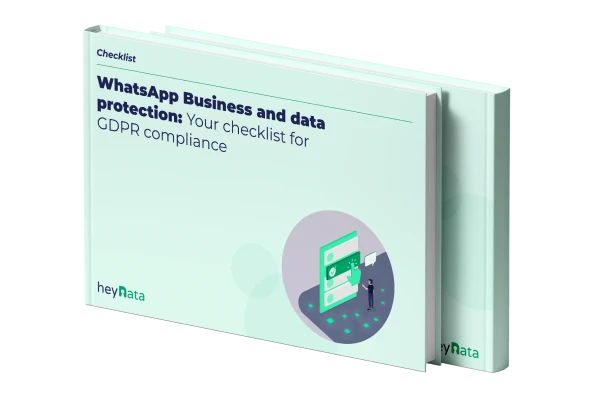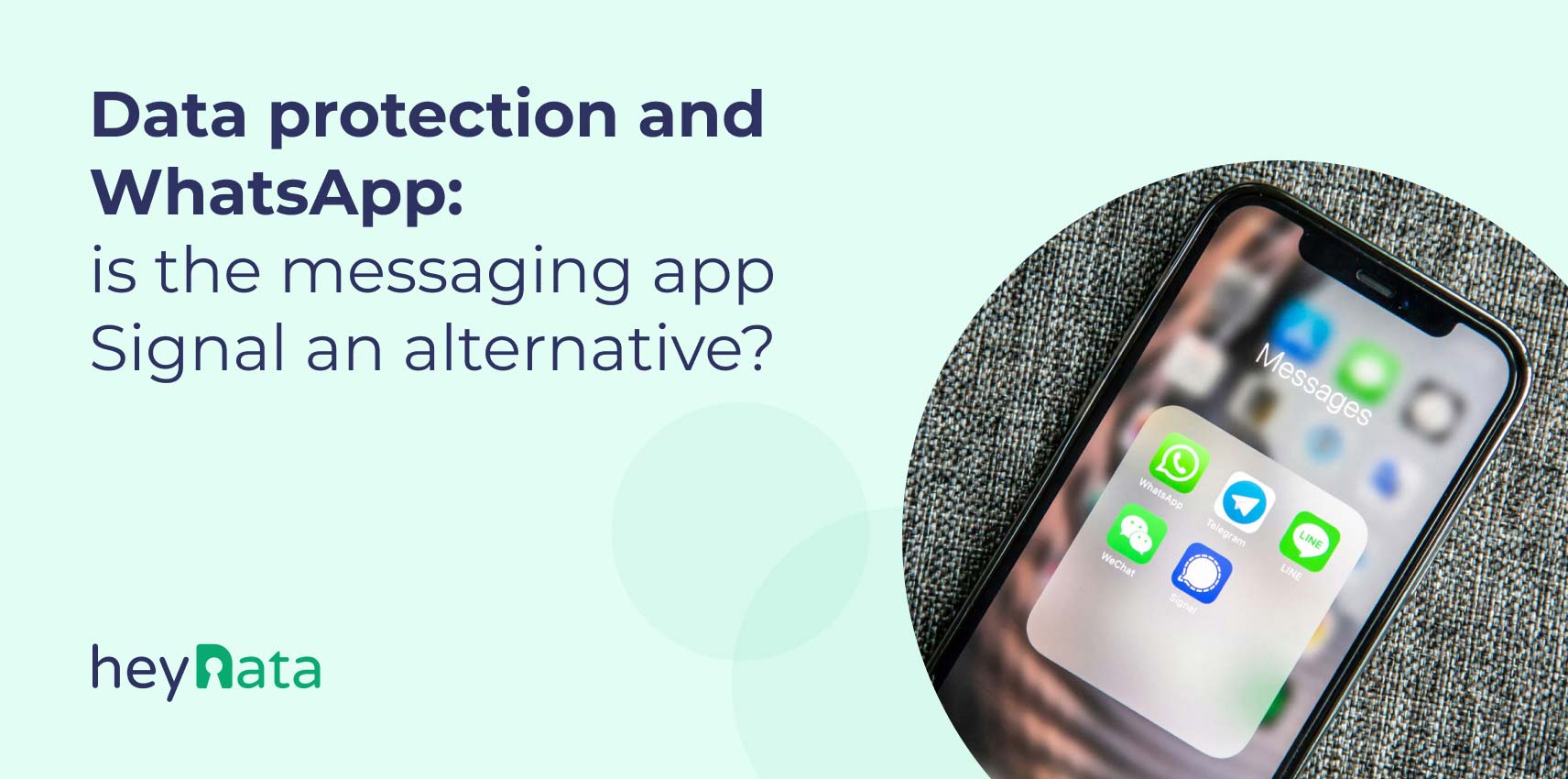
Using WhatsApp Business While Staying GDPR-Compliant
Communicate securely with WhatsApp Business – our 10-step checklist helps you stay on the right side of data protection laws.

WhatsApp vs. Signal: Which Messenger Is Better for Data Protection
'%3e%3cpath%20d='M26.6667%2020.022L30%2023.3553V26.6886H21.6667V36.6886L20%2038.3553L18.3333%2036.6886V26.6886H10V23.3553L13.3333%2020.022V8.35531H11.6667V5.02197H28.3333V8.35531H26.6667V20.022Z'%20fill='%230AA971'/%3e%3c/g%3e%3c/svg%3e) Summary
Summary
- WhatsApp is tightly integrated with Meta/Facebook, metadata is shared.
- End-to-end encryption exists, but doesn’t cover everything.
- WhatsApp stores messages on US servers, problematic for GDPR compliance.
- Cloud backups (especially in WhatsApp Business) weaken privacy.
- Signal offers better privacy by default: no ads, no monetization via data.
- Companies should consider privacy-focused alternatives like Signal or Threema for internal communication.
Many people use WhatsApp to stay in touch with friends, family, and colleagues, but not all users know that the messenger is backed by the social media platform Facebook, which is known as a data octopus. WhatsApp users can therefore not always be sure that metadata and contact numbers are not being transmitted to Facebook. Facebook's hunger for data has always been viewed critically by data protectionists and alternatives are offered with Signal and Co.
Table of Contents:
How to rate data protection on WhatsApp?
WhatsApp has become an integral part of today's society and over two billion users use the practical messenger service. Few people think about data protection and what rights they are entitled to with the introduction of the GDPR. Users should take a particularly critical look at the loopholes that WhatsApp and Facebook use about the GDPR.
The parent company Facebook has often been criticized when it comes to the use of personal data and the field of data protection, as European standards tend to be neglected. Facebook has responded to external pressure and unpleasant media reports by introducing end-to-end encryption for WhatsApp. This is a first step to ensure that messages and phone calls cannot be received by a third party. At the same time, it is also possible to assign data protection priorities in the WhatsApp settings. This allows the provider to clearly define data usage and visibility for other users.
Despite all of WhatsApp's efforts, leaks relating to data protection continue to come to light. In 2017, it was reported in the press that a developer had managed to read the online status of every user using only their WhatsApp phone number. The data obtained can thus be used to create communication logs that jeopardize data security on the internet.
How does WhatsApp handle existing data?
WhatsApp is a classic data collector, but theoretically, thanks to end-to-end encryption, it is not allowed to access chats, images sent, and voice messages received. Nevertheless, there is still enough metadata that WhatsApp can collect and analyze. This includes profile pictures, billing data, general user information, and location data.
Of course, the right to information under Art. 15 GDPR also applies to WhatsApp, meaning that the user can obtain an overview of the data collected by WhatsApp. In response to a request, WhatsApp sends a report showing all the data collected and stored.
If you want to request a report from WhatsApp, this is relatively simple:
- Open the WhatsApp messenger
- Select the Settings item
- Open the account
- Request the account information
After about three days, the messenger service will send a report containing the stored information. The report is divided into the areas of user information, usage information, registration information, and general settings.
Business customers in particular often back up their WhatsApp histories. If this is cloud-based, the effect of end-to-end encryption no longer applies. This means that cloud service providers now manage the accumulated data. The storage of chat histories can be deactivated in WhatsApp - under Chat, Chat backup, automatic backup, you can switch off the automatic backup functionality.
It is particularly important to note that all undelivered WhatsApp messages are stored on servers located in the US. When it comes to data protection, experts generally prefer the use of European servers. Although WhatsApp also guarantees that the data on American servers will be deleted after 30 days, the company tends to keep a low profile if you ask WhatsApp in more detail.

Using WhatsApp Business While Staying GDPR-Compliant
Communicate securely with WhatsApp Business – our 10-step checklist helps you stay on the right side of data protection laws.
Is it possible to exist without WhatsApp?
Sure, there are plenty of privacy-friendly alternatives like Signal, Threema, or Wire, but let’s face it: WhatsApp is everywhere. It has become so dominant that many people feel they have no real alternative.
Even internal company chats are often handled via WhatsApp, making it difficult for employees to avoid the platform altogether.
WhatsApp owes its success to one thing: convenience. It’s easy to use, packed with features, and almost everyone is already there. For many users, privacy concerns take a back seat when weighed against usability and reach.
Other messengers struggle to compete unless your entire social circle makes the switch. For companies serious about data protection, tools like Signal or Threema are a better choice.
It’s unlikely WhatsApp will lose ground, unless a major privacy scandal erupts or a competitor offers must-have features that force a shift.
What data does WhatsApp share with Facebook?
Using WhatsApp means accepting its terms of service and agreeing to share your metadata. This includes device info, usage patterns, and contact numbers. WhatsApp forwards this data to its parent company Meta (formerly Facebook).
According to WhatsApp, this data exchange is meant to protect users from spam, fake accounts, and misinformation. But the truth is: once you’ve agreed, you can’t opt out.
By citing “legitimate interest,” WhatsApp and Facebook effectively bypass core principles of the GDPR — and many privacy advocates consider this a legal gray area.
Signal vs. WhatsApp: Which messenger protects your data better?
Of course, many people are tied to WhatsApp, as in most cases their social circle is also active on the somewhat controversial platform. However, many WhatsApp users are also aware that there are secure alternatives that also focus more on data protection.
If you ask a data protection officer, they will refer you to Signal. Signal stands for security and secure privacy, which is also indicated by the disclosed source code. This is particularly attractive, as any security risks or spying activities would be noticed immediately.
Unlike WhatsApp, which introduced end-to-end encryption later on, Signal had it from the start. And while WhatsApp is owned by Meta, Signal is run by a nonprofit foundation and funded by donations.
How much data privacy does Signal offer?
Signal also has to process data, but only necessary data is collected and used. If authorization has been granted, the user's telephone number and contact details are used. Signal does not require any more data, as Signal does not make any profit from data.
If you do not want to enter your real name in Signal Users have the option of using a pseudonym or even an emoji.
Call setup data is encrypted and anonymized. Thanks to end-to-end encryption, no one not even Signal can read your messages or listen to your calls. This applies to one-on-one chats, voice/video calls, and even group calls. Especially for companies, this level of privacy makes Signal a highly attractive choice.
How Signal handles your messages
A unique feature of Signal is "disappearing messages". Here, a time limit is set and messages can no longer be viewed once the selected time has expired - this means they are deleted by the application. Messages are not stored on external servers they stay on your device only. So there’s no need to worry about where Signal hosts its servers or if they’re GDPR-compliant. Encryption is always on and doesn’t need to be activated manually. Signal is private by default.
Conclusion
WhatsApp may be convenient, but it comes with trade-offs in data privacy. If you’re serious about GDPR compliance and digital trust, Signal is a strong alternative. It’s open-source, nonprofit, and collects virtually no user data.
For businesses, choosing the right messenger isn’t just about features, it’s about protecting your users and your reputation.
Frequently asked questions (FAQs)
What personal data does WhatsApp collect from users?
WhatsApp collects metadata like your phone number, IP address, device info, usage behavior, and even location.
Are my WhatsApp messages safe?
Your message content is encrypted, but metadata is not. That data can be shared with Meta (Facebook) and used for profiling.
How is Signal different from WhatsApp?
Signal collects minimal data, doesn’t store messages on external servers, and is operated as a non-profit. No ads, no tracking.
Can I use WhatsApp legally in a GDPR-compliant business context?
Only with strict controls and documentation. Tools like the WhatsApp Business API or alternatives like Signal are more secure.
What makes Signal better for data protection?
Signal uses strong encryption by default, doesn’t share data, stores no messages externally, and is fully open source.
Important: The content of this article is for informational purposes only and does not constitute legal advice. The information provided here is no substitute for personalized legal advice from a data protection officer or an attorney. We do not guarantee that the information provided is up to date, complete, or accurate. Any actions taken on the basis of the information contained in this article are at your own risk. We recommend that you always consult a data protection officer or an attorney with any legal questions or problems.


